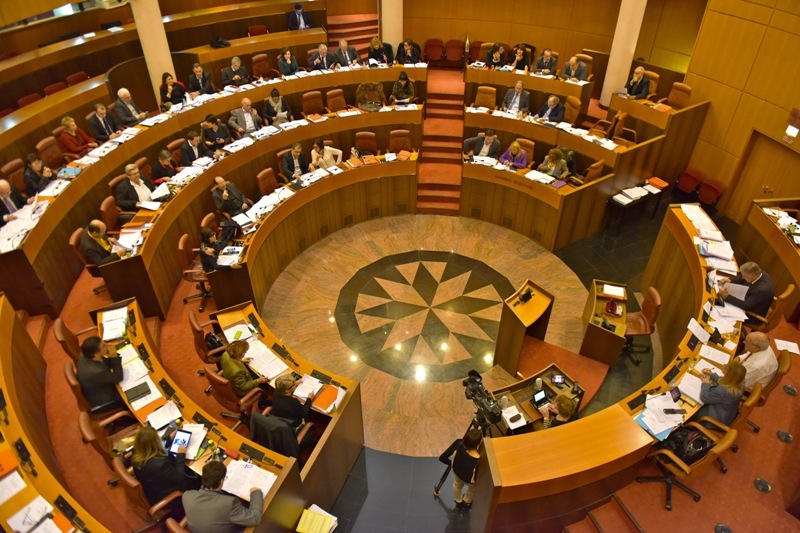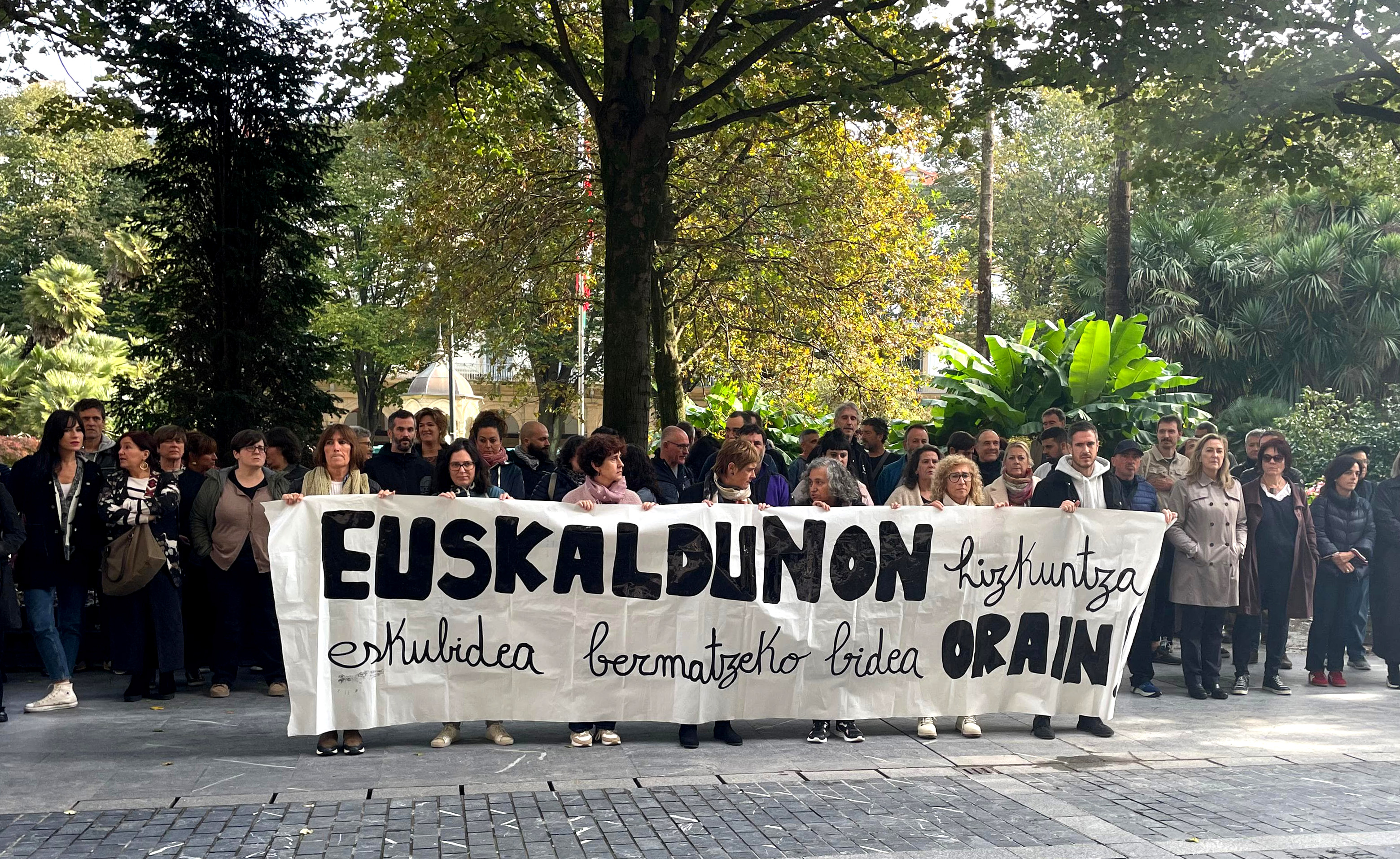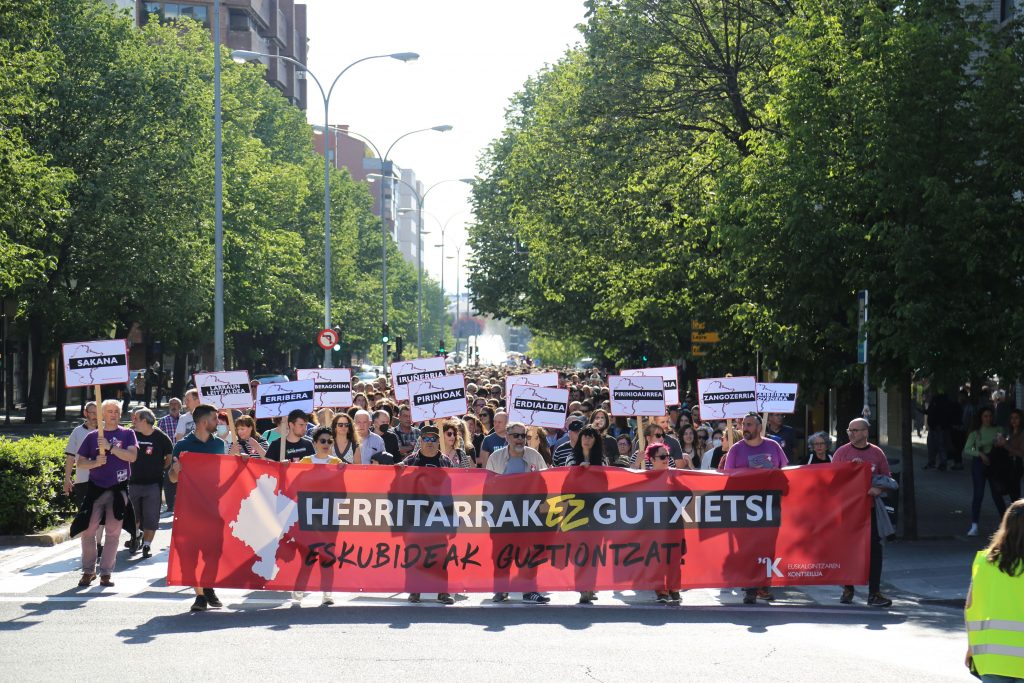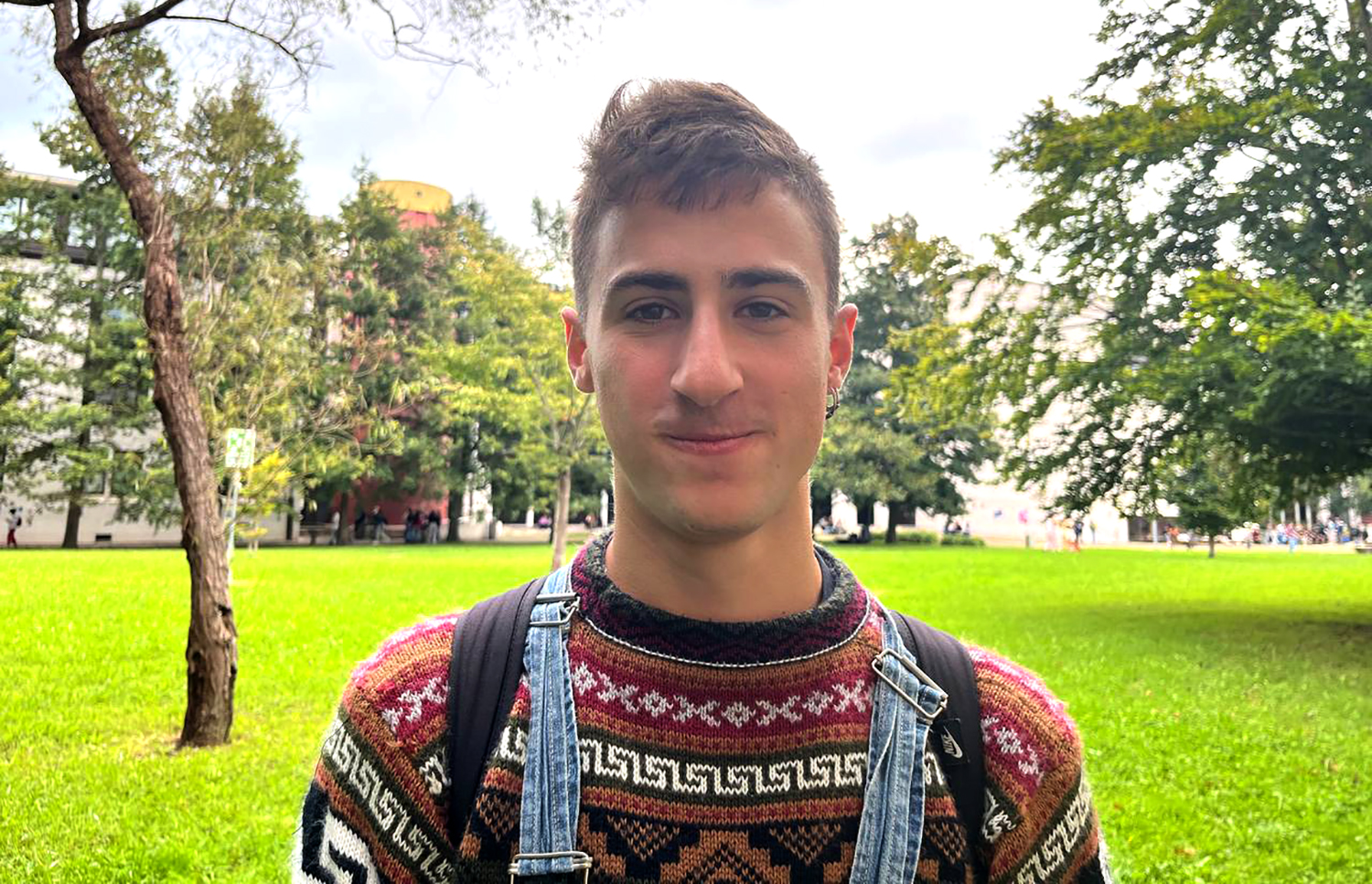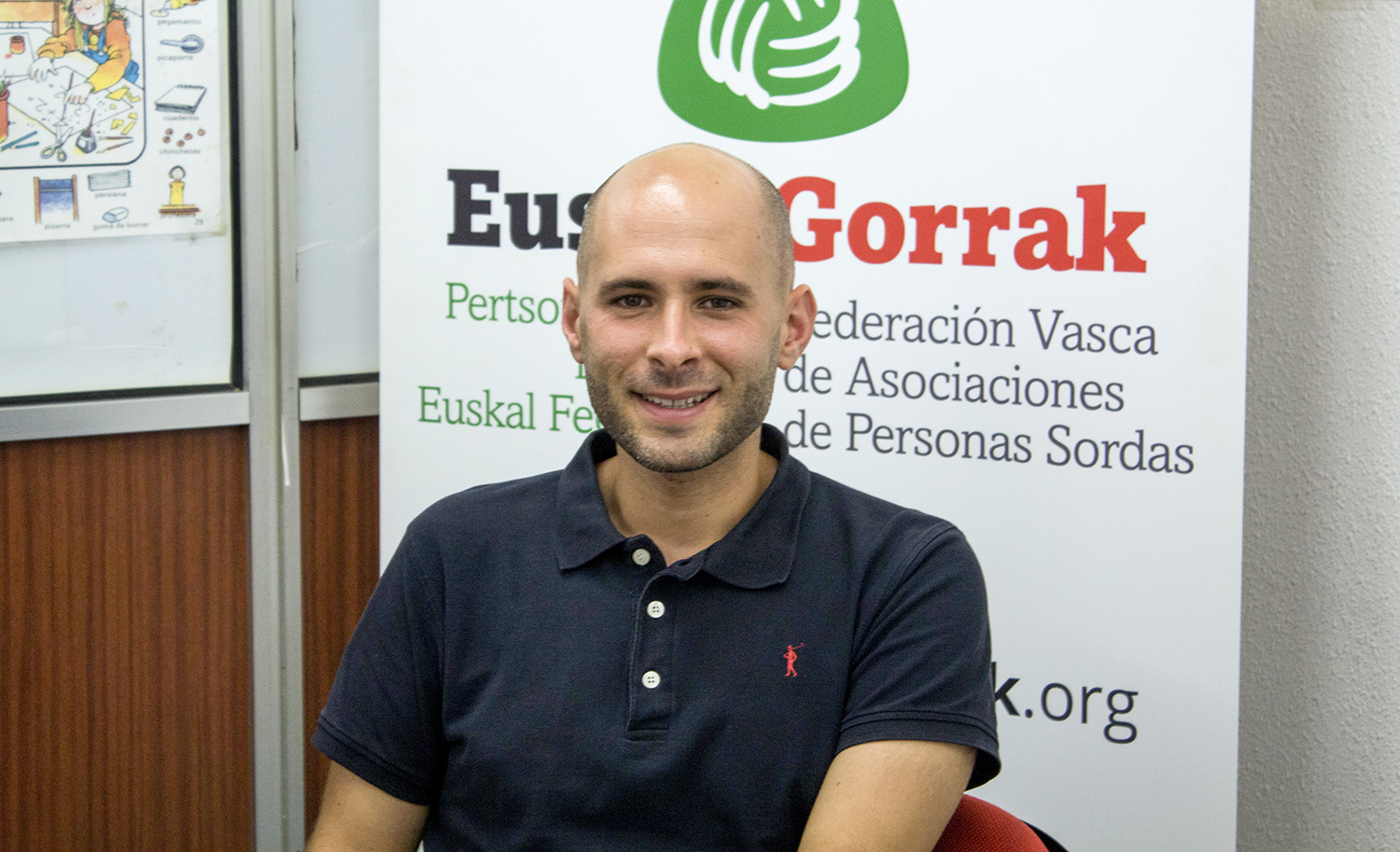The time for change is over
- When the government of change in Navarre enters the final straight line of the legislature, dozens of voices from the world of Basque culture cast a cry of urgency: time is over. This government has the last opportunity to repeal the exclusive vascuence law that divides and classifies Navarre and Navarros into three levels, and to draft a new law. To overcome zoning “now is the time,” they say. On 27 October they convened a demonstration in Pamplona/Iruña to denounce the death of the young man.
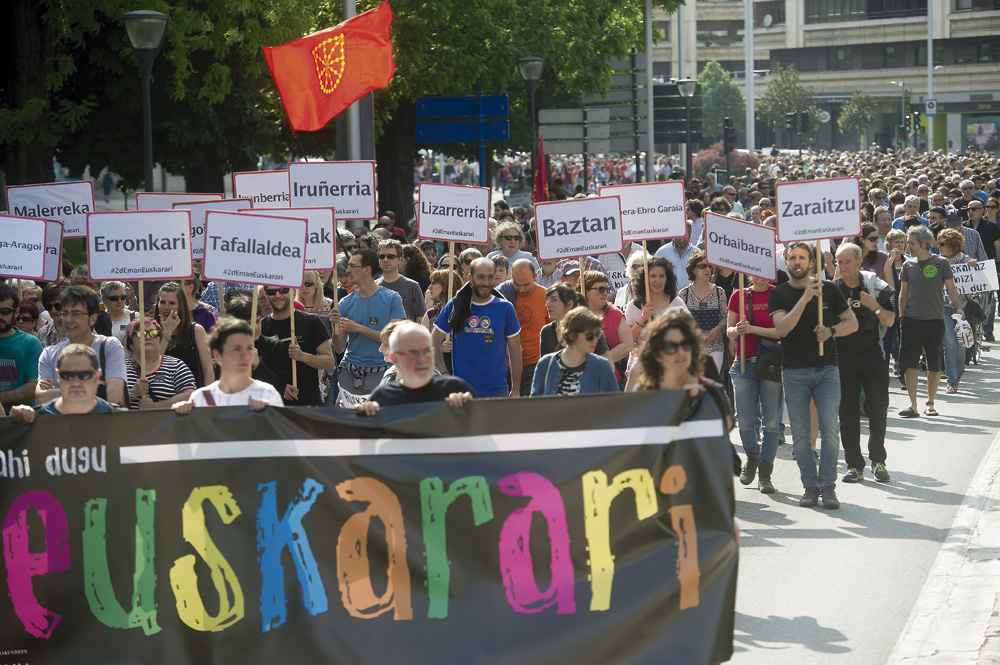
Illusion and opportunity. Thousands of Navarros felt this when they were aware of the results of the 2015 forced elections. The illusion, because they saw the possibility of taking steps in the field of linguistic rights and on the road to the normalization of the Basque country. Navarre came from dark times: During the long years of UPN’s mandate, the exclusion of Euskera and Euskaldunes was one of the hallmarks of the country’s identity. Paul Bilbao Sarria, Secretary General of the Council of Social Entities of the Basque Country, explained, “In the legal corpus, both in the plans that were implemented and in the resources dedicated to the Basque country, the discrimination that the government had made to the old language for years was evident.
With the victory of the government of change, a new scenario was opened in Navarre, and the work of those who until then were in the Basque world changed to adapt to the new situation. “Euskalgintza decides at that time that this change of government will only be real if there is a real change in language policy,” the members of the Council explained. And what is the fundamental step to be able to make a profound change towards the Basque country? Well, repeal the Vascuence Act until 2017 and draft a new law.
Navarre and Old Law
The Navarros have been suffering for more than 30 years the consequences of the Law of the Basque Country passed by Parliament in 1986. The zoning of this law divides Navarra into three parts and classifies citizenship according to its rights in relation to the Basque country. “Why do we have to have different rights as Basques if all the rights of the other areas are equal for everyone?” asks Susana Bidar Andueza, neighbor of Tierra Estella.
Although it seems to many that time is very fair, in the Council they believe that if there is real will there may be a real opportunity to change the law.
In the Council they denounce that the existence of differentiated rights within the same country occurs only in Navarre and with the Basque country. According to them, parity is an issue that must be brought to all areas, so the recognition of the same rights to all Navarros is a demand for justice. Elurre Iriarte Bañez de Baztan, resident in the Vascophony area, makes an interesting reflection on zoning and rights: “I live in the Vascopan area, but I have no right, but my space. So if as a citizen I move from my territory, like Pamplona or Tudela, I lose rights. That is not a right.”
Advances yes, but limit “glass ceiling”
In the opinion of the members of the Council, it is undeniable that over the past three years the Government has changed its attitude towards Euskera. “Now we hear the lehendakari of Navarre in Basque, the visualization of the Basque country has resumed in the elements of the government, the aid has been recovered… there is an attitude,” says Bilbao. One of the main changes in the legal framework is the decision of the Navarre Parliament of May 2017 to move 43 localities from the non-Basque area to the mixed area. Only one town has passed from the mixed area to the Vascophony area: Door to door. “All these movements were considered positive, no doubt, but not sufficient. Finally, in the mixed area, the Basque Country is not official. It is true that some rights are recognized, but not those that are recognized to a Baztan or an Etxarri,” explains Bilbao.
Both the Council and the interviewed citizenship believe that change has occurred mainly in attitude and in words, but they are still far from the principles that should govern life in Basque in Navarre. “Since the new government entered, a few small steps have been taken, but if the law is not changed, it does not matter what steps are taken, because according to that law we have no right to anything,” says Alizia Iribarren Andueza, of the so-called ‘non-vascophony zone’. Similar responses have also been received from the rest of the population: In Tierra Estella, Comarca of Pamplona, Valle de Baztan… in daily life, in practice, there have not been too many changes, at least due to the steps taken by the government.
The Council Paul Bilbao Sarria uses the idea of the ‘roof’ of the Basque Country to explain the main obstacle that has occurred in recent years to move forward: “The government has put in place a strategic plan that has been shared with the world of Euskera over recent years, but the point is that when we put it in place we are constantly faced with a roof: it is the law the roof”.
Commission for the drafting of the new law
Last February the possibility of amending the Vascuence Law was opened in the Parliament of Navarra: Following the request of EH Bildu in October 2017, Parliament then agreed to set up a special committee. What has been the work of this committee? Well, to propose a new Basque law based on three criteria: to guarantee the linguistic rights of all citizens, to overcome zoning and to extend the official status of the Basque Country to the whole of Navarra.
UPN and pp decided not to participate in the committee after the first working session, while the PSN, although it decided to continue, made it clear from the outset that it is not in favour of changing the current law. Therefore, it seems that the quartet that forms the government has the key to change the law.
The demonstration on 27 October will start from three columns, a symbol of the three spaces in which the Basque Country is divided. The three columns will join to symbolize the end of zoning and the officiality for the whole of Navarre
After months of participation by different actors and experts in the world of Euskera, the commission’s work has been terminated on 3 October with the contribution of the Council: the citizens have gathered the consequences of zoning and presented a proposal for the new law of Euskera. Now, the Commission would agree on its proposal, submit it, and it would be up to Parliament to launch it or decide what to do. Although many feel that the time is very fair, in the Council they believe that if there is real will there may be a real possibility of changing the law.
On October 27, the motto “Once and for all the official Basque in all of Navarre”
During the month of October, the Council organized mobilizations in Navarre to demand that Parliament and the government act with determination and responsibility at a crucial time. On 27 October there will be a great demonstration in Pamplona: “We will demand equality among all people, justice and officialdom,” the Council said.
The demonstration will start from three columns, a symbol of the three spaces in which the Basque Country is divided in Navarre. The three columns will join to symbolize the end of zoning and the official status for the whole of Navarre. “Officialdom is a status. Then, we know that the development of the official will require progressivity, flexibility. But the basic law has to recognize the same rights to all Navarros,” says Bilbao.
“We are always telling the government and the administrative authorities to do this or that, but in the end in this country the greatest achievements have come from the citizens,” says Iriarte, of Baztan. In the same vein, the General Secretary of the Council, Idoia Mendia, has also spoken. “Change has come to Navarre, among other things, because a change was also needed from the Basque country. In other words, we Basques and Euskaltzales have been subject to this change, we too have made it possible. But we want to make change from the Basque and the Basque”.
Faces of zoning
“Our thing is a matter of luck, not of rights”

“Zoning, in my opinion, is a limitation, a limitation of rights, an absurd one. We have to pay the taxes in the same way, most of the rights are the same… but suddenly, in the area of speech rights everything changes.
In daily life, especially in administration, you have no right. Although I am in the mixed area, I am going to make a request and ask for paper in Basque, and that is often impossible. If you're lucky you can find a Basque, but it's a matter of luck, it's not a matter of rights.
In the City of Estella there has also been the same change in Navarre, and it has been noticed that in the town there has been an increase in the presence of the Basque Country, it has been given visibility. But change doesn't go at the speed that we would like. From the government everything is “yes, we will”, but the legislature is going to end and we do it… We will see, now you have a real chance.
I would ask the government and Parliament to bring equality to all areas, to treat us on equal terms, whether Basque or non-Basque. I want to have the same rights as non-Basque people. Many people talk about taxation. I impose on Me yes, I get Spanish every time I go to an office. I will not force anyone to speak in Euskera, but let me speak in Euskera in total freedom.”
“If we meet thousands of people in the streets of Pamplona, they will have to listen to our voice”

“Zoning is meaningless and divides our territory into three areas. If I am not mistaken, Navarre is the only place in the world where something like this happens. It is not logical, it is rather surrealistic to classify the inhabitants of a territory in terms of language.
I live in that non-vascophony zone, and zoning affects me all day by day. Zoning says that in this field we have no right in Basque, we have zero right. Therefore, the City Council does not make any offer in Euskera, and furthermore, we do not have the right to request it.
It doesn’t matter how many decrees, how many changes the people are going through from one area to another… it doesn’t matter if that law is not actually repealed or amended. The real change would be the elimination of zoning, as long as it is not done, the rest becomes disgusting.
We have put politicians in that place, in principle they should work for us, and if we meet thousands of people on the streets of Pamplona on 27 October, they will have to listen to our voice.
“I live in the Vascopan area and have had a Spanish doctor all my life”

“Zoning is a mistake that has lasted 30 years and is still there. It was a mistake to have created that law in its day, but it is also a mistake not to have changed. I think it was an opportunity to take this issue from the very beginning.
I live in the Vascophony zone, but the Vascuence Act is not above contracts. For example, when a doctor is given a new contract, he is not required to have an Euskera profile. I have had a Spanish doctor all my life and the doctor who came when he retired was casually Basque. Therefore, if you live in Basque in the administration, it is by chance.
The labeling of the roads are many in Spanish, so our linguistic landscape is largely Castellanoparlante. With regard to education, for example, the son had to go to Gipuzkoa to study because he had no offer in Basque here. Once you finish high school in Navarra there are very few offers in Basque, you have to go to the community if you want to learn Basque.
It is no small matter that the lehendakari is Euskaldun, compared to what we have had so far in Navarre. But the truth is that I have missed the daring on the part of the government. You have to have courage to move forward on what you believe. That is, whether or not you really believe.”
“It’s more than 30 years since the law was made and now there are many more people who want to live in Basque”

“As a result of zoning, in the region of Pamplona we have to live in a permanent struggle in several situations: In Sarriguren, for example, we had to fight for years to get a Model D school, and earlier in kindergarten I was also unable to register my daughter in Euskera because there was no choice to register her. For years it has been a constant struggle from the point of view of education.
Going to the doctor is often not a comfortable situation, and not having a doctor or a vasco-speaking pediatrician is very hard for me. Go to the doctor with her daughter, live her in Basque at home, and have to speak in Spanish with the doctor...
More than 30 years have passed since the drafting of this law and the situation has changed a lot since: many more children are studying in model D and many more people want to live in Basque. There will always be opposing positions, but I am sure that in the examples I have given before, those who say that today the Basque thing is imposition, have had no problem. They have always had those rights guaranteed and we have been underestimated. Therefore, it is time to fulfill the desire to live in Basque. That doesn’t mean that others can’t continue to make themselves their own.”
Korsikako legebiltzarkideek ezin dute Korsikako Asanblean korsikeraz hitz egin, Bastiako Auzitegiaren 2023ko epai baten arabera. Ebazpen horri helegitea jarri zion Asanbleak, baina debekua berretsi du orain auzitegi berak. Epaiak tokiko beste hizkuntzei eragiten diela ohartarazi... [+]











